Back in the van out of Baalbek, we get waved down at a police checkpoint where everyone has to hand over passports or ID’s. There is one guy from Syria. He has to get out of the van and we leave him as he now has a lot of talking to do with the police. Why they make him get out I do not know the reasons why. Good luck bro. We once again transition out of the desert and ascend into cold fog as we cross the mountains back onto the green Mediterranean side. Once we get into Beirut, we are dropped off at an unknown roundabout and no English. We walk a few blocks calling out names to neighborhoods around our hostel but drivers shake their heads in misunderstanding, the chaos of the busy streets making it frustrating to shout over. We stop at a restaurant to rest for awhile and then wave down a taxi.
The hostel is full of people now and the balcony table crowded with tobacco and beer bottles. There is a group of German guys and I get talking to them. One is an Officer in the German Army on vacation, he talks about his time in Afghanistan and how the enlisted are retarded. I don’t tell him I used to be in the Navy, but I laugh to myself knowing a few Naval Officers who also hold the same belief. We’re not all that bad. The others had just come from The Gambia and tell me there is more weed there than Bob Marley could smoke. There is also a couple of people here with the Red Cross. Really interesting to hear their stories from working in the camps and making plans on how they can do best with the situation. I remember one of them being an Aussie who could fluently speak Arabic. Impressive. The guys I went to Baalbek with, along with several others from the Netherlands, France, and Australia, decide we go to Byblos in the morning.
Now we feel like pros with the public transport. We walk to a roundabout called Daoura towards the northern suburbs, wave a bus and when we call out “Byblos?!”, right away we’re on and off. The highway follows close to the sea, in what feels like an endless city. They seem connected to each other in one unending line. This area of coastline is completely populated. Perhaps because of the past conflicts, most areas and buildings are quite grey. Concrete. Not the same as architecture in other countries. However, the sun, sea, trees, flowers and other various plants add vibrancy.
Byblos is claimed to be the oldest (or one of) continuously inhabited cities in the entire world with evidence of settlement going beyond 8000 years ago. There are ruins from multiple civilizations from the beginnings of the Phoenicians and their alphabet, Bronze Age temples, Greeks, Persian, Roman, Byzantine, Crusaders, and Ottomans. The entire city is basically a UNESCO World Heritage site. We get dropped close to the souk and walk through a dark, smoke filled haze of food and market vendors. Rays of sunlight piercing through the occasional gaps in the tarp. The main area of ruins is massive and you could spend an entire extra day thoroughly walking amongst all of it. There is a main entrance at the castle. You walk up the steps and from the top can see views across the town and sea. I’ve always enjoyed exploring physical ancient history. Makes things so much more profound than a book or TV. Just imagining how things could have been like. The people of the time had their own lives, hopes, dreams, and beliefs. But now they are gone, and that will be us as well someday. We go to the beach next to the ruins and enjoy the rest of the day in the sun. It was easy again to get a ride from the highway. Just wave to the van.
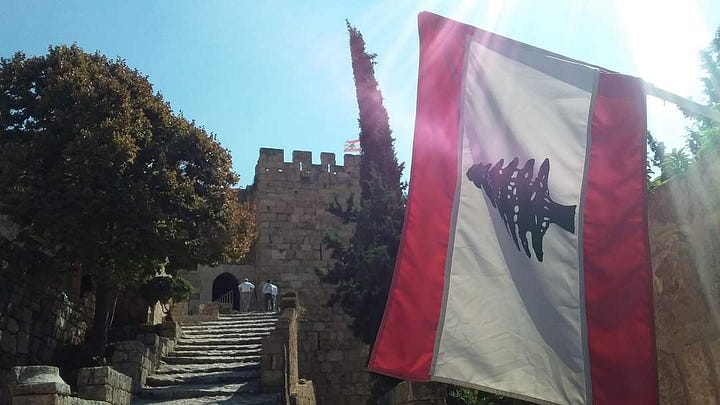
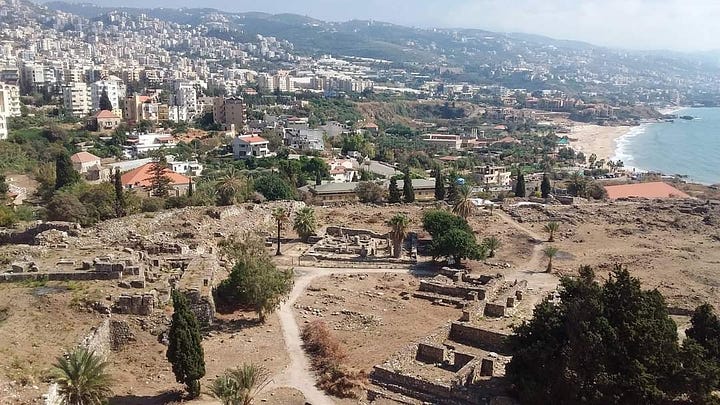
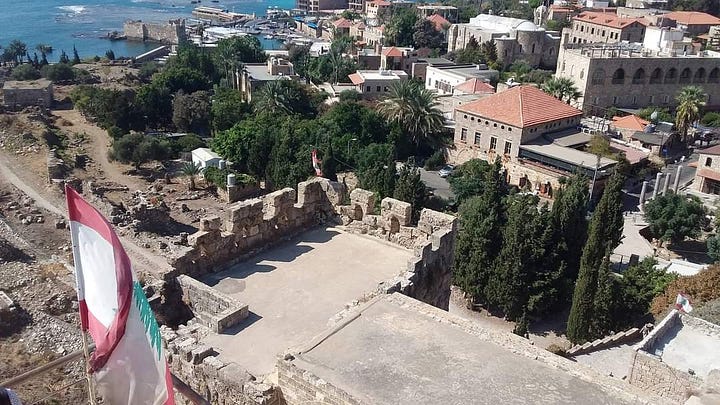
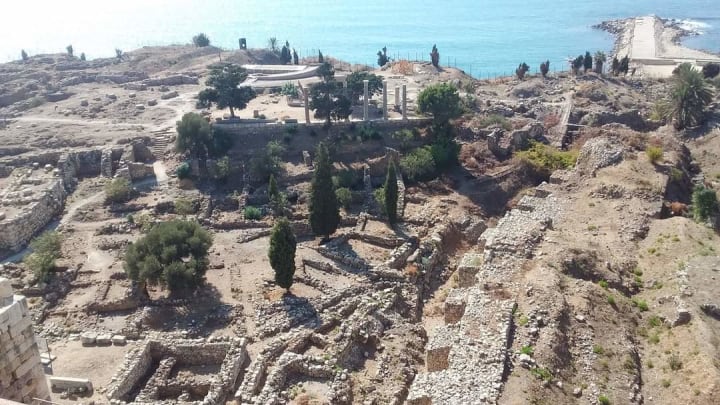
Back at the hostel, I meet a gentleman from the UK named Navjot Sawhney. He was in the process of starting his own NGO called The Washing Machine Project. From the website, his mission is to “provide off-grid manual washing machines to people in low income and displaced settings. Our goal is to empower women by alleviating the burden of unpaid labour through sustainable solutions.” His project since I met him has truly taken off and become a massive success. He has now helped thousands upon thousands of people and it is incredible to see the positive changes.
https://www.thewashingmachineproject.org/
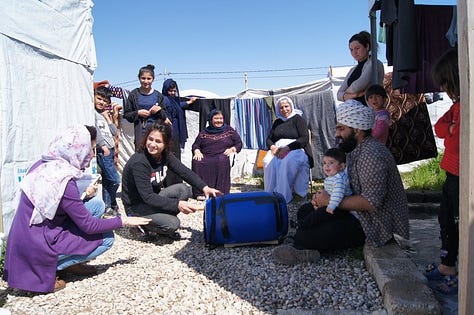
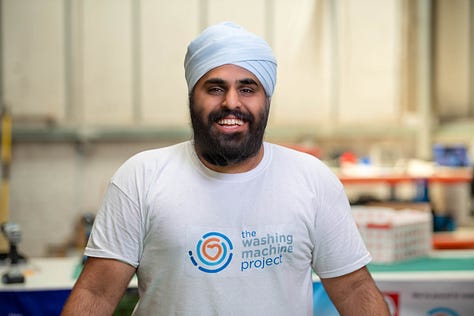
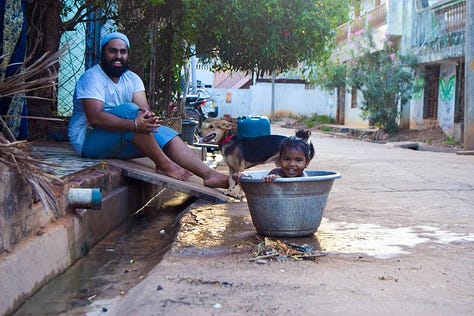
The young couple who work reception tells us about this awesome outdoor club that will be the best place for partying tonight in Beirut. So the Baalbek group, the Aussie group, Mr. Sawhney and I decide we have to go see it for ourselves. Most clubs start late here. 1:00 or 2:00am. We grab a couple of taxis and head over. Unfortunately I don’t remember the name, nor can I find the right one on the map. We arrive and line up. Just like the couple told us, its all outdoors. Once we’re inside, I’m really impressed by the set up. Close to the sea, is the stage and dance floor. Behind that a large square bar. Behind that a bean bag lounge area, nice tables and hookah. Beyond from there food stalls and relaxed booths. Great music you would expect for dancing, and they had cold air jets mounted above the stage to blow across the crowd. I have a video but it doesn’t seem to want to load onto here. Perhaps I will update later.
Now the time has come to do a few weeks volunteering with WorkAway at a bed & breakfast in Aaqoura. The village is far up into the mountains, close to the transition from sea to desert. To get there, the host has me meet their personal chauffeur in the neighborhood not far from Byblos called Nahr Ibrahim. I wave down the bus and ride up. I get off alongside the highway and walk up the intersection. They told me the driver will wait at the corner. I come to a bundle of parked Mercedes taxis at the top of the intersection and this old fellow comes up to me “Aaqoura? Volunteer?” Amazing sometimes how you can just go to a place and find the person you’re looking for. The small back road quickly climbs in elevation and weaves its way through tiny villages and expansive olive tree orchards. Each village is on its on plateau, and higher up like steps other villages make their life. It takes an hour to get to the guesthouse.
The place is called Guita Bed&Bloom. A lady and her son run it with the help of two handyman from Syria, and two maids from Ethiopia. I join three Danish volunteers. Its a big property. Two floor main building, large backyard with multiple terraces of pine and olive trees. There are some construction projects we’re going to work on, as well as occasionally helping the hosts with guests. We sleep in tents towards the edge of the terrace with a view of mountains and valley below.
We would start our day around 8:00AM before breakfast time for the guests. Eat together something simple and nice such as eggs, potatoes, hummus, bread, and olive oil. During the day, the others would assist the guests with food service, and housekeeping. The Danish and I had to create the foundations for a shack on the highest terrace. We started measuring dimensions for initial posts as well as where we were to dig and pour concrete foundations for the posts. Later we would have the rest of the day off to relax or explore, as well as on weekends. Now, let me say that this place is really nice, and the people I worked with were good. However, despite many positive WorkAway experiences, there was some things here that became lack luster. Let me explain.
In many places throughout the Arab world, they take hierarchy seriously. They take status seriously. Prestigious degree, good job, nice car. It matters a lot to them. Now, is there anything inherently wrong with those pursuits? Not necessarily. Everyone is just trying to live a better life. But what I observed is they take on many Ethiopian or Filipina maids and employ labor from less well off countries. Huge families would come to the guesthouse in what seemed to be a show of expenditure. The Filipina nanny’s would be hustling back and forth with the kids while the parents drank wine. There was two Ethiopian girls working here. They told me they were the lucky ones getting paid $300/month. One is a mother. She hasn’t seen her children in years. They heard stories of workers passports being taken away and forced to work longer hours and endure abuse. I heard stories about something similar happening in Dubai. One of the Danish was a girl. She said she thought she was being used as a stage piece. A white European girl serving them. Lebanese people treated me kindly after I told them I was American. But what if I was from the Philippines? Would they act differently? All of them would always ask me the same questions pertaining to my education level and job. They would then tell me about their accolades even though I didn’t ask. “Education is important.” they would tell me. I couldn't convince them that traveling the world is an education in its own way. Also there was so much decadence in cuisine. All the steps of what to eat during the course. The many types of silverware and glasses. Placement and etiquette. After traveling through some terribly poor places where I observed people happy to just eat rice with their bare hands, I could never truly engage with and enjoy fine dining.
We were given one broken shovel and a small garden pickaxe. No gloves. It took us a long time to dig the holes 3ft deep, 2ft wide x4. Hard, dry soil, and stubborn rocks made leveling our square more instigating. We had some funny conversations about American stereotypes. The more I traveled the more I saw just how many people really take on those beliefs. We represent our country when we go overseas….Try to leave a good impression. We’d use a string to gauge the level and distance to the center point of each hole and make sure proper alignment once the posts went in. From the kitchen you could hear Ethiopian music from the girls as they began cooking for the guests. Above us on the next terrace the neighbor would sit on his porch and was constantly on his phone. After a rapid ringtone he would joyfully bellow “HELLOOOO!” with every new person he talked to. It happened dozens of times. The Syrians would help us when it came time for the concrete. Mixing the old fashioned way with water and a little dirt, turning it over with the broken shovel. Then, one bucket at a time, carry it up the terrace and fill up the holes. We placed rocks and sticks at the bottom around the post to help stabilize it.
One of the Danish guys was with an NGO called Crossing Lines:
https://www.crossinglines.org/
Teaching the kids how to slackline. Just to give them positive energy and something fun to occupy their minds. They also organize highlining festivals. I think its a really cool project and great way to interact with the people. If you are into slacklining and if you happen to end up in Lebanon, I highly recommend you check them out. He had tied a line in-between two trees and we would practice our balance after work. It’s quite fun once you get the hang of it!
Guests would come and go. Sometimes we did not always have an opportunity to talk to them. Plus the host asked us to give them privacy and not bombard them with too much interaction. After the guests ate dinner we would eat together. One of girls speaks some English and says Addis Ababa can be a hard place, and everywhere in Ethiopia is difficult to make a good life. The Syrians are from the coastal towns of Tartus and Latakia. They said its really nice and one of the most unique areas in the Mediterranean. They talked about all the wonderful and great things in Syria but never mention specifics about the war. I never ask them about it but I’m sure they have suffered. They lived in a small house at the edge of the property. Two small beds in a room and a garage which has become a storage unit. They invite me to share some drinks together and watch Syrian TV. One of those older box tv’s with the antennas on top. What we watch I can best describe it as the Syrian version of The Three Stooges. Filmed perhaps in the 80’s. Really interesting. No English but they try to translate for me. They point out certain areas where the show was filmed. Syria is not all desert. There is also green and it looks superb. They tell me I am welcome to visit them someday when things get better. I hope I can go. We hear another joyous “HELLOOOO!” from the neighbor. I tell them I’ve never seen a man talk to so many people for so long on the phone before. They said it’s because he’s Egyptian.
The guesthouse was a good walk away from the village of Aaqoura. On the way there are these cliff trails you can walk up. Many small edifices of The Virgin Mary and Crosses line the trail cut into the cliff face. When you get to the village there is also a large church with full views of the valley.


I hike to the top of the mountain above. There was no trail so I had to clamber over rocks and boulders. Its also very steep. At it’s summit is a cross and the near instant transition to desert. So fascinating to see. I sit on the edge and gaze at life below. Further up the road is a plateau with dozens of lakes. Far beyond that is a protected forest of Cedar trees. Some of the last few still remaining. You also see this tree on the Lebanese Flag. On the way back there is also a cave you can explore.
One day while preparing food for the guests, a guy with a camera crew comes to visit the guesthouse. His name is Anthony Rahayel and he has a YouTube Channel/Instagram called nogarlicnoonions.
youtube.com/rahayel
Mostly in Arabic, he travels the world and explores the cuisine of all the places he visits. He’s curious to know what I’m doing and we talk awhile about volunteering and traveling. He takes a picture of me and in one of his episodes you see a tour of the guesthouse. You can even find this picture of me on google maps!
The Danish couple were leaving. They tell our Syrian friend all the bad words in Danish. We share some good laughs and tell them “See you later”. The people you meet make the memories. I’m happy to have shared such a connection with them in that point in time. I will say it was unfortunate the connection was not the same with the host and her son. Perhaps just engaged heavily with their business.
Just a few more days before my flight to Egypt. I also have a WorkAway set up there. Me and the Crossing Lines guy struggle to make more progress with the broken shovel. It was a bit futile, but eventually the foundations are set. The concrete has hardened and the future WorkAwayers can lay the flooring. My Syrian friend and I do some construction shopping in the neighboring village Qartaba. I was just along for the ride really. Just listening to the handling of business in Arabic. On my last day, the host brought in a chef to cook a whole lamb on the rotisserie for a large group. By far some of the best I’ve ever tried. We do some dancing in a large circle. It is time for me now to head back. I tell the others “See you later”, but the exchange is sadly cut short as they have to attend to the large group. The same elderly gentleman picks me up in his beat up, dusty Mercedes taxi. As we begin to head down the road I swear I hear one last “HELLOOOO!”.
I shake hands with the man as I’m dropped next to the highway. I was shocked to hear so much noise from the traffic and didn’t recall how bad the air pollution was. Higher up in the mountains it was so clean and quiet. Back in the same hostel it is all different people now. A common phenomenon if you travel a lot in hostels: You get to know the group when you are there and those people become your temporary tribe. The connection and friendship can be strong despite being so short-lived. Soon after however, they move on and you may feel an emptiness inside. The cycle repeats as you find yourself making the same old small talk with new people. Yes its beautiful to meet new people and share good times with them. However, I think there can also be a coldness and stoic detachment that can build up once you’ve said one too many “See you laters”. There can be a transition moment where you don’t feel like socializing at all. One of the few cons of travel and it just comes with the choice you made to explore.
On my way to the airport, I tell the Uber driver he has a beautiful country and I hope more people come to visit. He’s surprised and with a wide smile thanks me and wishes me well. Lucky for me, no bad attitudes today at customs. I’m through quickly and wait for my next journey…
Stick around for later when I talk about my time in several African countries, and more wild stories. Thanks for reading!
-AbroadwithBrian






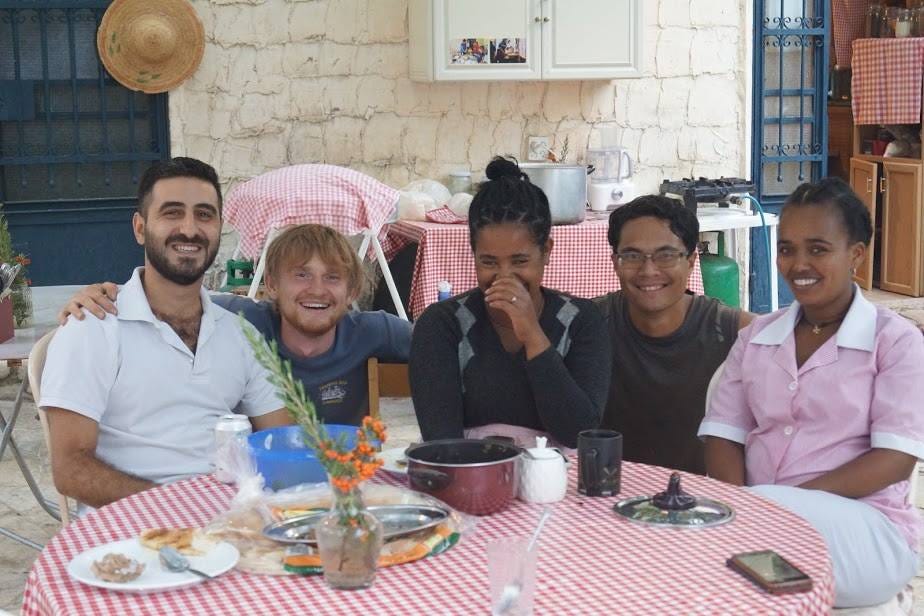
Woah Brian that's cool to hear that you were in the Navy!
"The people of the time had their own lives, hopes, dreams, and beliefs. But now they are gone, and that will be us as well someday." I think about this sometimes as well. Will future generations look at the machines we used for transportation, for instance, with as much wonder as we look at folks who used a horse to get around?
"Amazing sometimes how you can just go to a place and find the person you’re looking for." - If more people knew the universe works out this way a lot, I think we'd have more travelers in this world!
"After traveling through some terribly poor places where I observed people happy to just eat rice with their bare hands, I could never truly engage with and enjoy fine dining." Another true quote. I look back on the brands I used to wear and feel like such an idiot. I don't think I'll ever want to lead a life of decadence at all after what I've seen. It's just obnoxious.
Great post Brian.